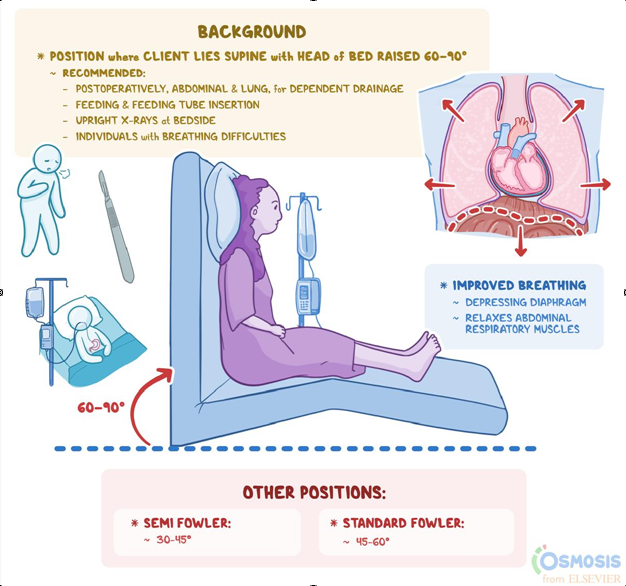A nurse is collecting data from a client who has heart failure. The nurse notes the client has crackles in the bases of the lungs, shortness of breath, and a respiratory rate of 24/min.
Which of the following actions should the nurse take?
Instruct the client to cough every 4 hr.
Encourage the client to ambulate to loosen secretions.
Increase the client's intake of oral fluids.
Maintain the client in high-Fowler's position.
The Correct Answer is D
Explanation
D. Maintain the client in high-Flower’s position
Crackles in the bases of the lungs, shortness of breath, and an increased respiratory rate are signs of pulmonary congestion, which is commonly seen in heart failure. Maintaining the client in a high-Fowler's position, with the head of the bed elevated to a 45-60-degree angle, helps reduce venous return to the heart, decreases fluid accumulation in the lungs, and improves breathing comfort for the client.
The other options are not appropriate actions for the client's condition:
Instructing the client to cough every 4 hours in (option A) is not the priority action in this situation. Coughing may not effectively address the underlying cause of pulmonary congestion and may not provide immediate relief for the client.
Encouraging the client to ambulate to loosen secretions in (option B) is not the priority action in this situation. While ambulation can be beneficial for overall health, the client's symptoms of pulmonary congestion require immediate attention to improve respiratory status.
Increasing the client's intake of oral fluids in (option C) is not the priority action in this situation. While maintaining adequate hydration is important, excessive fluid intake can worsen the symptoms of heart failure and contribute to further fluid accumulation in the lungs.
Therefore, the nurse should maintain the client in high-Fowler's position (option D) to promote optimal lung function and improve breathing comfort. It is important to promptly notify the healthcare provider of the client's condition for further assessment and intervention.

Nursing Test Bank
Naxlex Comprehensive Predictor Exams
Related Questions
Correct Answer is C
Explanation
Fontanels are soft spots on an infant's skull where the bones have not yet fused together. The anterior fontanel, located at the front of the head, typically closes between 12 to 18 months of age. The posterior fontanel, located at the back of the head, usually closes by 2 to 3 months of age.
The other findings mentioned are typical developmental milestones for a 4-month-old infant:
- Rolling from back to abdomen: By 4 months of age, it is expected that infants can roll from their back to their abdomen. This is a normal developmental milestone.
- Moves objects to mouth: At 4 months, infants begin to develop hand-eye coordination and the ability to reach for objects. Bringing objects to the mouth is a typical behavior at this age as infants explore their environment.
Correct Answer is D
Explanation
The nurse should intervene when the AP raises all four side-rails on the client's bed. While it is important to ensure the client's safety and minimize the risk of falls, raising all four side-rails can be considered a restraint and may not be the best practice for fall prevention. The use of physical restraints, including all four side-rails, can lead to adverse outcomes such as entrapment, increased agitation, and decreased mobility.
Locking the wheels on the client's bed: This is an appropriate action to prevent the bed from rolling and ensures stability.
Clearing furniture from the path leading to the bathroom: This is a good practice as it creates a clear and safe path for the client to walk without obstacles.
Assisting the client to the bathroom every 2 hours: This is a proactive measure to prevent falls by ensuring regular toileting and minimizing the need for the client to get up and move independently.
It's important to promote mobility and independence for the client while ensuring their safety.
Whether you are a student looking to ace your exams or a practicing nurse seeking to enhance your expertise , our nursing education contents will empower you with the confidence and competence to make a difference in the lives of patients and become a respected leader in the healthcare field.
Visit Naxlex, invest in your future and unlock endless possibilities with our unparalleled nursing education contents today
Report Wrong Answer on the Current Question
Do you disagree with the answer? If yes, what is your expected answer? Explain.
Kindly be descriptive with the issue you are facing.
